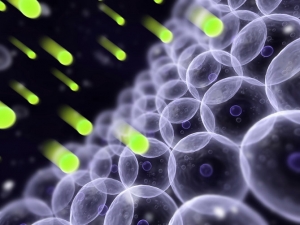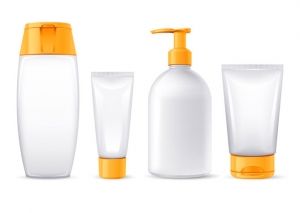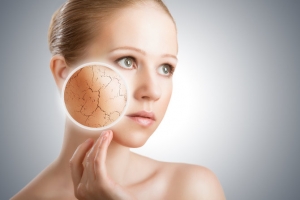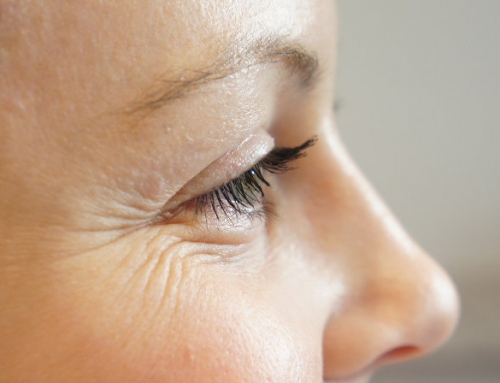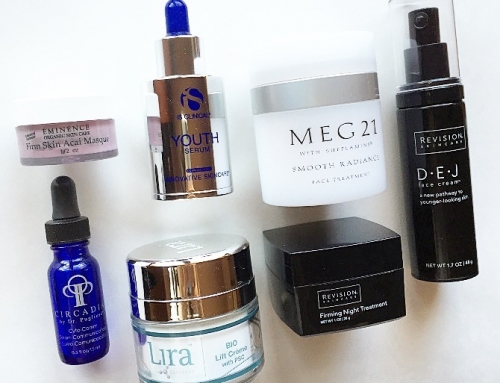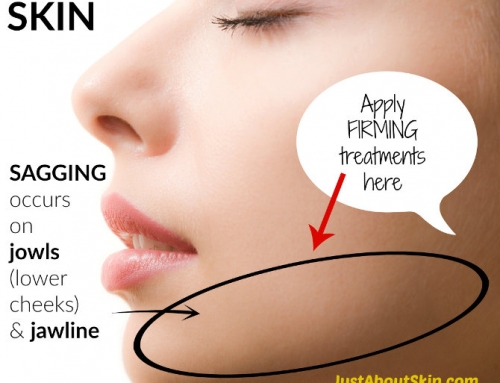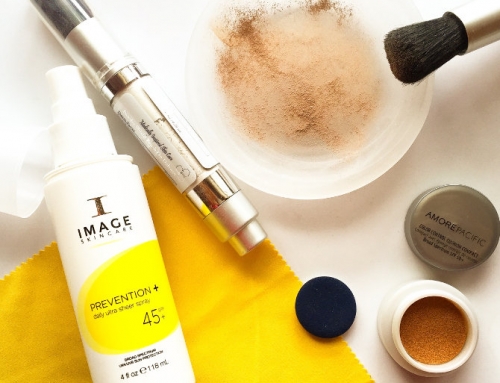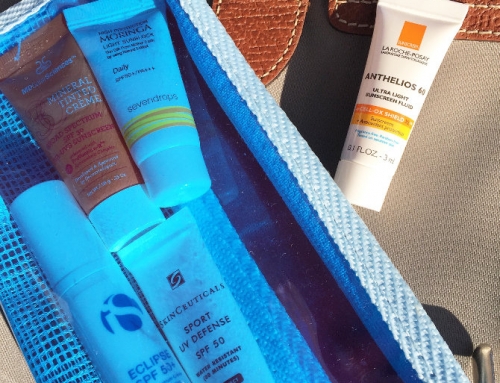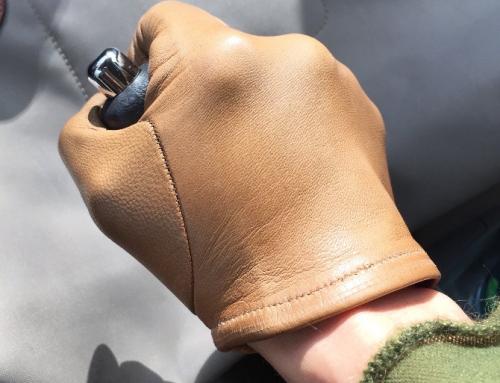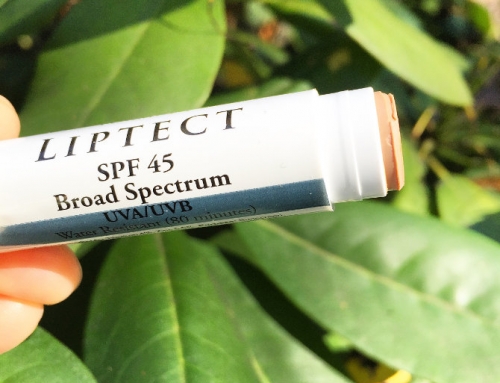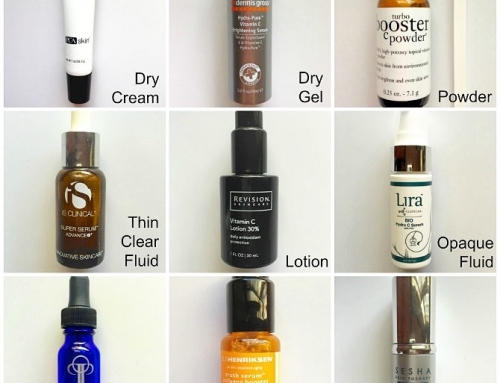It’s a good time to review aging before I move on to my next topic (acne). Here is a summary of the most important things to know. I have condensed the Anti Aging Guide (so far) into 1 page.
I hope that it gives you a more cohesive understanding of aging. Having this background will give you a better idea of what to look for in skin care products and what lifestyle choices matter.
Why Does Skin Age?
Free radical damage is the primary cause because it is so prevalent. Free radicals come from various external sources (sun, pollution, smoke, xrays, ozone, rancid fats, heavy metals, drugs, and more). But they are also produced internally, through the process of digestion and breathing! Therefore, it is impossible to eliminate free radical damage entirely. In fact, 90% of the free radicals generated in the body are due to the act of breathing! (This occurs in the mitochondria, the part inside a cell that generates all your body’s energy). Although we cannot completely eliminate free radical damage, we can take steps to minimize it.
Free radicals damage everything in their path (cells, proteins, lipids, DNA). The worst kind is DNA damage. Damaged DNA that is not repaired leads to mutations, and mutations can lead to cancer. They also cause cells to die. Naturally, unhealthy or dying cells accelerate skin aging.
Inflammation also causes aging. Inflammation is a reaction to some sort of stimulant – bacteria, viruses, insect bites, wounds, toxins, cosmetic ingredients, drugs, free radicals, and so on. How does this affect skin? Inflammation starts the breakdown of collagen & elastin, causing wrinkles and sagging.
You may wonder why would our body want to break down tissue? There is a good reason – it is the body’s way of repairing a ‘wound’ and rebuilding damaged tissue. This makes sense if you’ve been wounded, say by a cut. Damaged skin tissue needs to be cleared away for new skin. But the body doesn’t discriminate between a cut or an ingredient that happens to trigger inflammation. It will chew up tissue (collagen & elastin) indiscriminately. (By the way, the new tissue is never as strong or smooth as the original. Think about scar tissue.)
What’s important to understand about inflammation is that even a small amount of irritation causes inflammation. Low-level inflammation is typically not visible. It is happening even if you can’t see it on your face. This is what we call chronic inflammation. Chronic inflammation sustained over a lifetime ages skin. Therefore, it is crucial to maintain a strong barrier function. A strong barrier reduces the chance for infection or irritation.
Aging is also caused by stress, which raises cortisol levels. In fact, stress is a huge accelerator of premature aging.
Cortisol is a stress hormone that thins the skin. And if that isn’t bad enough, stress also exacerbates every skin condition, such as acne.
Sugar ages skin by triggering a process called cross-linking. Cross-linking occurs when two things bind together. In skin, sugar attaches to collagen, making collagen stiff. (This is called glycation, a form of cross-linking.) When collagen turns hard, skin loses its firmness. Free radicals also promote cross-linking.
There are other reasons why we age, which you can read more about in the Anti-Aging Guide. But these are the most important concepts to understand.
What Can We Do To Slow Skin Aging?
The key strategies of a good anti-aging regimen are:
Minimize Exposure to Free Radicals– You can’t stop free radicals but you can slow them down. With antioxidants and ingredients that reduce oxidative stress.
Increase DNA Repair– For the free radicals that you can’t stop, you need a good repair system. In skin care, we can try to strengthen that repair system with ingredients. One way I have discussed so far is to increase cellular energy. For example, ergothioneine, an antioxidant found in mushrooms, is a good way to boost cellular energy, which in turn is needed for DNA repair.
Reduce Inflammation– The best way to do this is to incorporate anti-inflammatory ingredients in your skin care products and eat anti-inflammatory foods (ginger, garlic, and onions for example).
Maintain a Strong Barrier Function – A weak or cracked barrier increases the chance for inflammation. A strong skin barrier requires good habits (not over-cleansing or over-exfoliating for example) as well as proper skin care ingredients.
What Products Should I Use?
This is the #1 question people ask me all the time. And my answer is the same every single time. The most important product in your bathroom should be your SUNSCREEN. This is by far the easiest and cheapest way to slow aging. But you need to choose the right one.
My Sun Protection Guide goes into great detail about this, and I highly recommend that you read all of it, and if you don’t have time, then read the One Minute Version.
The right sunscreen makes a big difference (many are not effective at blocking UVA). So you should make the time to find the right one for you.
Believe it or not, sunscreen will do most of the hard work for you. Roughly 80-85% of skin damage that you see later in life is all thanks to UV damage from the sun. The earlier you start wearing sunscreen, the better. It’s never too late to start. The sun is relentless – it will continue to damage your skin no matter how old you are.
In my experience, people who have consistently worn sunscreen almost always have younger looking skin than their peers. It truly does make a difference. Sunscreen is such a major factor in aging that when I started this blog, I chose sun protection as my first topic.
As for specific products, my next post will provide simple tips on what to look for in products. (Advanced users, I’ll go over advanced ingredients & techniques by and by.)
My philosophy about products can be summed up this way:
Skin First, Then Products
You first need to understand what’s going on in your skin before you choose products.
My goal on this blog is to empower you with the knowledge to care for your skin correctly and make smarter product choices. You can read more about my philosophy here.
The last thing I leave you with is this: About 90% of the visible signs of skin aging are caused by lifestyle factors (UV, smoke, alcohol, drugs, foods, etc.) This kind of aging is called environmental aging, and it is largely within your control.
That’s good news! It means you don’t need to be born with good skin genes to age well. You can age well simply by making smart choices about your products and lifestyle.
Next: 21 Anti-Aging Tips
If you want to read more about aging, start with How to Navigate the Anti-Aging Guide, which will guide you to the right sections based on your level of interest.


